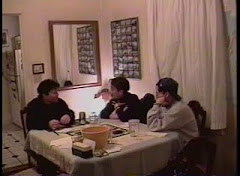Wednesday, October 7, 2009
Data Session Fri. Oct. 30th, 4:30 PM
date: Friday, Oct 30th (had been planned for Oct 28)
time: 4:30 pm
location: Sociology 8108
Friday, May 8, 2009
Fall 2009 Data Sessions still to come:
David Schelly (Sociology) 10/30 4:30 (see location in post above)
Matt Holland (Sociology) 11/3 4:00
Heather Carroll (English Language and Linguistics) 11/18 11:00
Ceci Ford (English Language and Linguistics & Sociology) 12/4 4:30
*Participation in data sessions assumes training in and commitment to working with conversation analytic methods.
Monday, April 20, 2009
Margret Selting to visit UW CA Community


4:00-5:30 PM
Sewell Social Sciences 8146
*Sponsored by Sociology, English and the Applied |
Friday, March 20, 2009
Lorenza Mondada to visit. April 17-18

Her research deals with the grammatical and multimodal practices and resources mobilized by participants in interaction. Her current research is carried out on video-recordings from various institutional and professional settings (in medical contexts as well as in other workplaces) and on ordinary conversations, focusing on the ways in which participants sequentially and multimodally organize their (often multiple) courses of action.
Date: Friday, April 17th
Time: 4:00 PM
Location: Sewel Social Sciences Building, Room to be announced.
Abstract: This talk deals with the way in which participants in remote places coordinate their activities, taking for granted shared spaces, managing the discovery of fragmented and mobile geographies and actively searching for common ways of reassembling them. In order to explore these topics and to document the various practices through which co-participants coordinate, articulate and negotiate locations, spatial formulations, and common recognition of relevant places, the paper focuses on a “perspicuous setting” (Garfinkel & Wieder, 1992) which reveals the praxeological details of these practices: the coordination of remote activities in call centres. During calls, callers give their locations to call-takers, and call-takers give instructions to help-dispatchers about the place in which to find people to be helped. Often, misunderstandings arise about the helped location. The study of place formulations aims at a) documenting the various ‘methods’ (Garfinkel, 1967) through with participants make the relevant geography accountable and publicly intelligible and b) at making explicit the methodology that allows this documentation, based on the analysis of naturalistic video recordings of situated activities.
Contact Cecilia Ford: ceford@wisc.edu
We expect to have a data session on Saturday April 18th, and there will also be opportunities for graduate students and colleagues to meet informally with Lorenza.
Sunday, February 1, 2009
Andrea Golato to speak, Feb. 27th

A presentation on language and interaction by
Andrea Golato, University of Illinois at Urbana-Champaign
Description:
Using conversation analysis as methodology, this paper focuses on compliment sequences in German conversation. Specifically, it analyzes the form and function of appreciatory sounds (oh, ah) and expressions of embodied pleasure (mmh) in compliment sequences. The data for this presentation come from 35 hours of everyday conversation, both video-taped face-to-face interaction and audio-taped telephone interaction among native speakers of German from a variety of regions.
Andrea Golato is Associate Professor of German and Linguistics at the University of Illinois at Urbana-Champaign. Her research interests lie in conversation analysis, specifically the intersection of culture, grammar and interaction.
Time: 3:45-5:15
Location: Van Hise 254
